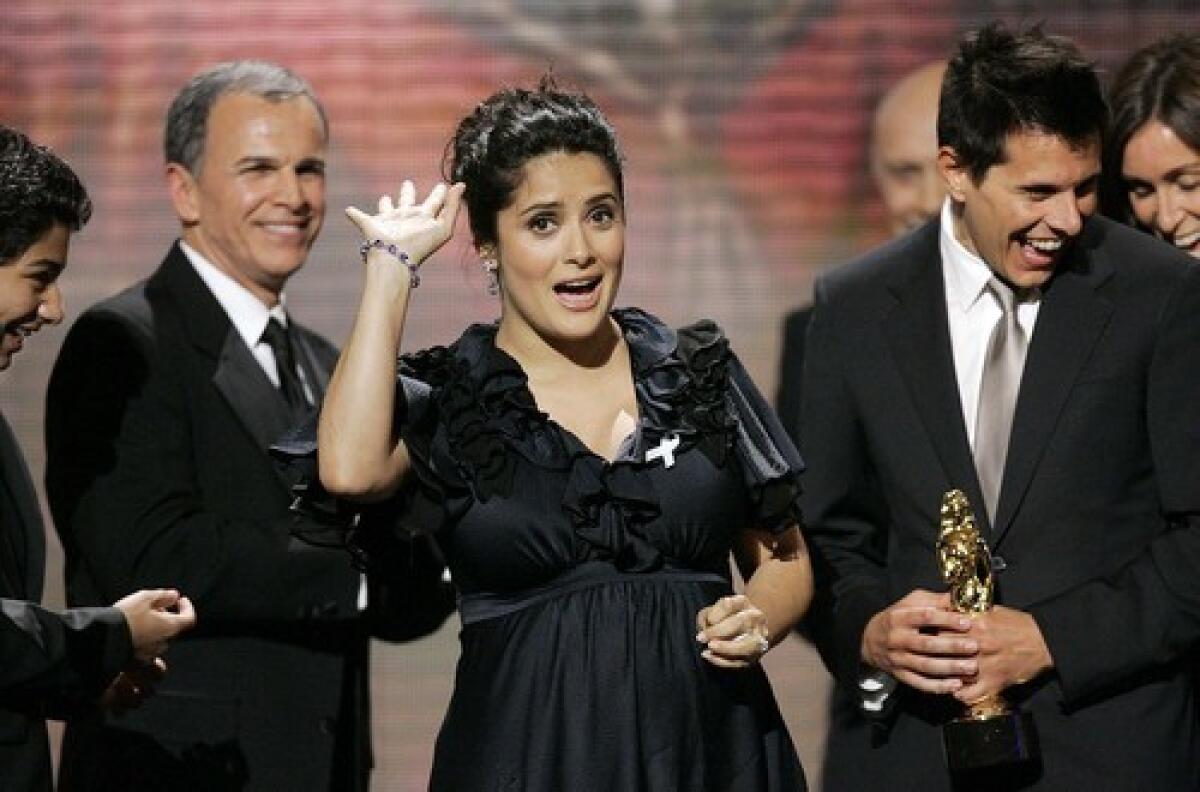She’s on a mission to make Latin films

For nearly a decade, actress Salma Hayek and her production partner, José Tamez, have been trying to launch a mini-studio that caters to the Latino audience. They’re finally getting some traction, thanks in part to the success of “Ugly Betty,” the popular television show they produce for ABC that is based on a Colombian soap opera, “Yo Soy Betty, la Fea,” and “Frida,” the 2002 biography of artist Frida Kahlo in which Hayek also starred.
In April, the pair got another break when Metro-Goldwyn-Mayer Inc. agreed to finance, market and distribute several Latin-themed movies under the label Ventanazul, a 50-50 venture with the studio. Hayek and Tamez said in a recent interview with The Times that they intended to make mainstream English-language films with talent from Latin America as well as the U.S.
Now comes the hard part.
Ventanazul wants to prove there’s a large audience for films with Latin cultural references. Latinos already see more movies than any other ethnic group. But Hollywood for years has grappled with how to tap deeper into this niche.
This year marked a breakthrough for Latino filmmakers. Mexican directors Guillermo del Toro, Alfonso Cuarón and Alejandro González Iñárritu each were nominated for Oscars for their films “Pan’s Labyrinth,” “Children of Men” and “Babel” and are now making a series of films together.
However, this summer’s Latin-themed films have not set the world on fire. Universal’s “Illegal Tender,” a gangster drama directed by Franc. Reyes and produced by John Singleton, got off to a sluggish start last weekend. Jennifer Lopez’s “El Cantante” did well in certain cities such as Miami and New York but has grossed a disappointing $6.8 million since its Aug. 3 release.
Previous attempts to reach Latinos with such films as “Chasing Papi” in 2003 and last year’s “La Mujer de Mi Hermano” have also been disappointments.
Ventanazul’s first release next year is expected to be an English-language adaptation of the Israeli coming-of-age film “Bonjour Monsieur Schlome.” Colombian-born Rodrigo Garcia will direct the movie, tentatively titled “Diego Ascending.”
Hayek, who is due to give birth any moment to her first child, said she would not be moving to Paris to join her fiance, François-Henri Pinault, head of fashion conglomerate PPR, which owns Gucci and Yves Saint Laurent.
Some excerpts from the interview with Hayek and Tamez:
Why aren’t more studios taking chances with projects aimed at the Latino niche?
Hayek: Because, honestly, there have been a lot of failures. You want to be conservative because there is not a clear vision of what the market is exactly.
But you want everyone to go see your films, not just Latinos, right?
Hayek: Yes. They will feel proud they are represented as Latinos and at the same time [other] Americans won’t feel alienated. The idea is to make movies that are a lot like “Betty” or “Frida.”
Tamez: The big studio movies try to include one Latino, one African American or one Asian to try to attract that part of the audience. We want to make projects from the Latino world and present it to the whole audience.
Did you approach other studios such as Disney, which has benefited from “Ugly Betty” as the owner of ABC?
Hayek: We love working with Disney and we have movies with them. But MGM was very determined to do this deal. They were very aggressive about trying something new.
Do you feel pressure to show that this can work?
Tamez: Yes. We are investing in this. If it works it will be good for us, but if it doesn’t work. . . .
Hayek: It’s not like we have a salary. We really are partners and we are investing time and money in it. . . . But I believe there is really a market. I know it’s there.
How has “Ugly Betty’s” success helped you as producers?
Hayek: It has helped us a lot. A combination of that and “Frida.” We haven’t done a lot of things, but the things we have done have either been commercial or critical successes. Even the little tiny things we have done for Showtime. . . . We have been trying to get a Latin-themed show on television for six or seven years.
Yes, in 1999 you had several TV projects with Sony but none of them came to fruition. Why?
Hayek: We were with Sony and Telemundo and Sony sold Telemundo. And then Sony television shut down for a period of time. . . . It’s very difficult. . . . You need to have a high level of passion for the project, especially when they are experimental and in a market that has not been proven.
It’s well known that Chief Executive Harry Sloan wants to double MGM’s $5-billion value over the next few years and take the company public or sell it. Does that make you nervous considering your Sony experience?
Hayek: You have to take the opportunities when they are there and make the best of them. Hopefully, if they sell, we will have created a great asset for the company. . . . If they sell, that doesn’t mean [our] company stops. We have certain protections.
Why do you think there hasn’t been a U.S.-born Latin director to break out since Robert Rodriguez [“Grindhouse” and “Spy Kids”]?
Tamez: In Latin America even though it is difficult to make movies, usually they have a little more artistic freedom. I don’t know that many of these wonderful movies that have come up from Latin America would have been done in the studio system.
Hayek: In Latin America the best talent goes to the festivals, have success in their countries and then they are tested in the American market. Here, it is harder for someone to get an opportunity. I think one of the biggest problems are scripts. . . . What are the Latino stories that we want to tell? We are in the middle of what I believe is a redefinition of who we are. Something has been happening in the last few years. These [Mexican] directors have stood out with a different voice that has a level of sophistication. . . . It’s a beautiful moment in history because we get to reinvent who we are. I think a lot of the secret is in having people accept that we have stories to tell and that they might not be able to anticipate what they are.
When you have your baby, are you going to stay in the U.S. or move to France?
Hayek: I’m going to stay and run this company. I had to make a choice. . . . I could just say I will give it all up and be a housewife in Paris. But I said, “No.” I was so lucky because I found myself a man who is a great businessman. And he loves it that I work this hard. He has a lot of respect for what I do. . . . He knows how important this is to me. This is a mission. We have been working for this all our lives. It’s a breakthrough, and in my lifetime, I want to see a change.
lorenza.munoz@latimes.com






